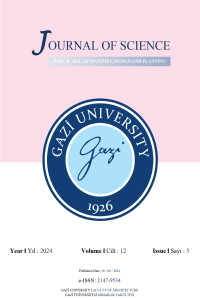Öz
Kaynakça
- [1] A.Y. Topraklı, S. SEDIHEMAITI, G. Ağraz, Osmanlı klasik dönem tipi modern camilerin tahliye problemine ilişkin değerlendirme, Gazi Üniversitesi Mühendislik Mimarlık Fakültesi Dergisi 34 (2019) 2261–2270. https://doi.org/10.17341/gazimmfd.490086.
- [2] M.S. Satır, A.Y. Topraklı, Türkiye yangın yönetmeliğine göre toplanma amaçlı yapıların tahliye performansının simülasyon tabanlı analiz edilmesi, Gazi Üniversitesi Mühendislik Mimarlık Fakültesi Dergisi 39 (2024) 2343–2352. https://doi.org/10.17341/gazimmfd.1281882.
- [3] A.Y. Topraklı, M.S. Satır, Türkiye’deki 15. ve 16. yy. dönemi tarihi camilerinin tahliye sürelerinin analizi, Gazi Üniversitesi Mühendislik Mimarlık Fakültesi Dergisi 39 (2024) 1953–1962. https://doi.org/10.17341/gazimmfd.1171323.
- [4] M.S. SATIR, A.Y. TOPRAKLI, Ankara-Altındağ bölgesindeki 18 tarihi caminin yangın tahliye risklerinin nitel ve nicel analizi, Gazi Üniversitesi Mühendislik Mimarlık Fakültesi Dergisi 36 (2021) 1613–1630. https://doi.org/10.17341/gazimmfd.824520.
- [5] N. Pelechano, A. Malkawi, Evacuation simulation models: Challenges in modeling high rise building evacuation with cellular automata approaches, Autom Constr 17 (2008) 377–385. https://doi.org/10.1016/j.autcon.2007.06.005.
- [6] X. Zheng, T. Zhong, M. Liu, Modeling crowd evacuation of a building based on seven methodological approaches, Build Environ 44 (2009) 437–445. https://doi.org/10.1016/j.buildenv.2008.04.002.
- [7] S. Wolfram, Statistical mechanics of cellular automata, Rev Mod Phys 55 (1983) 601–644. https://doi.org/10.1103/RevModPhys.55.601.
- [8] B. Chopard, Cellular Automata Modeling of Physical Systems, in: Encyclopedia of Complexity and Systems Science, Springer New York, New York, NY, 2009: pp. 865–892. https://doi.org/10.1007/978-0-387-30440-3_57.
- [9] A. Kirchner, A. Schadschneider, Simulation of evacuation processes using a bionics-inspired cellular automaton model for pedestrian dynamics, Physica A: Statistical Mechanics and Its Applications 312 (2002) 260–276. https://doi.org/10.1016/S0378-4371(02)00857-9.
- [10] C. Burstedde, K. Klauck, A. Schadschneider, J. Zittartz, Simulation of pedestrian dynamics using a two-dimensional cellular automaton, Physica A: Statistical Mechanics and Its Applications 295 (2001) 507–525. https://doi.org/10.1016/S0378-4371(01)00141-8.
A Review and Implementation Guide for Basic Cellular Automata Models in Pedestrian Evacuation Simulation
Öz
Efficient and safe evacuation of individuals during emergencies is critical to building design and public safety planning. Cellular Automata (CA) models have emerged as a valuable tool for simulating and analyzing pedestrian evacuation dynamics, offering a balance of computational efficiency and the ability to capture complex emergent behavior. This paper comprehensively reviews basic CA models for pedestrian evacuation simulation, exploring their fundamental principles, strengths, limitations, and implementation considerations. We delve into commonly used models like Floor Field Cellular Automata (FFCA) and Social Force Cellular Automata (SFCA), highlighting their unique characteristics, advantages, and potential drawbacks. A practical implementation guide outlines step-by-step procedures for developing and executing CA-based simulations, from defining the virtual environment and establishing behavioral rules to analyzing the simulation output. We emphasize the importance of data-driven approaches for model calibration and validation, ensuring the accuracy and reliability of simulation results. Finally, we discuss future directions for CA-based evacuation modeling, including integrating more sophisticated behavioral rules, developing hybrid models, and exploring three-dimensional simulations to enhance realism and predictive capabilities. This comprehensive review aims to equip researchers, practitioners, and students with the knowledge and tools to effectively utilize CA models for enhancing safety and preparedness in various evacuation scenarios.
Anahtar Kelimeler
Cellular Automata Evacuation Simulation Pedestrian Dynamics Crowd Modeling Safety Planning Emergency Preparedness
Etik Beyan
This article is a review of existing literature on Cellular Automata models for pedestrian evacuation simulation. As such, it does not involve the collection, analysis, or interpretation of any original human participant data.
Destekleyen Kurum
Innoarc Arge Ltd. Şti. Gazi Teknopark/Ankara/Türkiye
Teşekkür
The authors would like to acknowledge the support provided by Innoarc Arge Ltd. Şti. (Gazi Teknopark, Ankara, Türkiye) during the preparation of this manuscript.
Kaynakça
- [1] A.Y. Topraklı, S. SEDIHEMAITI, G. Ağraz, Osmanlı klasik dönem tipi modern camilerin tahliye problemine ilişkin değerlendirme, Gazi Üniversitesi Mühendislik Mimarlık Fakültesi Dergisi 34 (2019) 2261–2270. https://doi.org/10.17341/gazimmfd.490086.
- [2] M.S. Satır, A.Y. Topraklı, Türkiye yangın yönetmeliğine göre toplanma amaçlı yapıların tahliye performansının simülasyon tabanlı analiz edilmesi, Gazi Üniversitesi Mühendislik Mimarlık Fakültesi Dergisi 39 (2024) 2343–2352. https://doi.org/10.17341/gazimmfd.1281882.
- [3] A.Y. Topraklı, M.S. Satır, Türkiye’deki 15. ve 16. yy. dönemi tarihi camilerinin tahliye sürelerinin analizi, Gazi Üniversitesi Mühendislik Mimarlık Fakültesi Dergisi 39 (2024) 1953–1962. https://doi.org/10.17341/gazimmfd.1171323.
- [4] M.S. SATIR, A.Y. TOPRAKLI, Ankara-Altındağ bölgesindeki 18 tarihi caminin yangın tahliye risklerinin nitel ve nicel analizi, Gazi Üniversitesi Mühendislik Mimarlık Fakültesi Dergisi 36 (2021) 1613–1630. https://doi.org/10.17341/gazimmfd.824520.
- [5] N. Pelechano, A. Malkawi, Evacuation simulation models: Challenges in modeling high rise building evacuation with cellular automata approaches, Autom Constr 17 (2008) 377–385. https://doi.org/10.1016/j.autcon.2007.06.005.
- [6] X. Zheng, T. Zhong, M. Liu, Modeling crowd evacuation of a building based on seven methodological approaches, Build Environ 44 (2009) 437–445. https://doi.org/10.1016/j.buildenv.2008.04.002.
- [7] S. Wolfram, Statistical mechanics of cellular automata, Rev Mod Phys 55 (1983) 601–644. https://doi.org/10.1103/RevModPhys.55.601.
- [8] B. Chopard, Cellular Automata Modeling of Physical Systems, in: Encyclopedia of Complexity and Systems Science, Springer New York, New York, NY, 2009: pp. 865–892. https://doi.org/10.1007/978-0-387-30440-3_57.
- [9] A. Kirchner, A. Schadschneider, Simulation of evacuation processes using a bionics-inspired cellular automaton model for pedestrian dynamics, Physica A: Statistical Mechanics and Its Applications 312 (2002) 260–276. https://doi.org/10.1016/S0378-4371(02)00857-9.
- [10] C. Burstedde, K. Klauck, A. Schadschneider, J. Zittartz, Simulation of pedestrian dynamics using a two-dimensional cellular automaton, Physica A: Statistical Mechanics and Its Applications 295 (2001) 507–525. https://doi.org/10.1016/S0378-4371(01)00141-8.
Ayrıntılar
| Birincil Dil | İngilizce |
|---|---|
| Konular | Mimari Bilim ve Teknoloji, Tasarım Modelleri ve Simülasyonları, Veri Görselleştirme ve Hesaplamalı Tasarım, Yapı Endüstrisi Çalışmaları, Teknoloji ve Sistemleri |
| Bölüm | Mimarlık |
| Yazarlar | |
| Yayımlanma Tarihi | 30 Eylül 2024 |
| Gönderilme Tarihi | 7 Temmuz 2024 |
| Kabul Tarihi | 27 Eylül 2024 |
| Yayımlandığı Sayı | Yıl 2024 Cilt: 12 Sayı: 3 |


